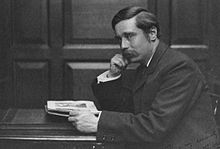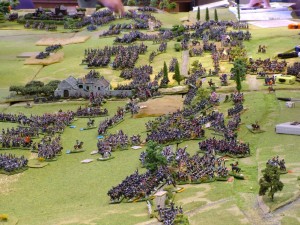I have two significant reasons for being thankful to Herbert George Wells (21 September 1866 13 August 1946). Firstly of course he was a writer who came out with a number of books of science fiction which along with his near contemporary,Jules Verne had influence on the evolution of the genre in the twentieth century. Secondly, although much less well known, he enjoyed the hobby of Miniature Wargaming (playing with toy soldiers) which I discovered at the age of 12 and I still pursue when I get the time. In fact I got into wargaming before I later discovered the joys of boardgames and roleplaying at university and which I tend to do more often these days.
Wells was born in the town of Bromley which is near London. His father was Joseph Wells – a shopkeeper of limited financial means who supplemented his income by earnings from playing cricket. Joseph injured his leg when Herbert was in his teens and the loss of income from cricket meant that his mother Sarah had to return to work as a domestic servant.
In 1874 Herbert broke his leg and spent weeks laid up at home. To pass the time he read extensively and this clearly had a good deal of influence on the young lad. Herbert’s education was restricted by the families poor finances. At times he was a student pupil -teaching younger boys as part of his payment for getting an education. He did well in Latin and the sciences. Later he was educated at the Normal School of Science in London. Between and whilst attending various schools he first worked as a draper’s apprentice and later a bookkeeper. He was never successful at these careers and eventually set out on a career as a Free lance writer.
Romantic Life
Having no money he moved in to stay with his aunt where he became engaged and married a cousin, Isabel Wells, but left her in 1894 for one of his students, Amy Robbins. he remained married to Amy until her death in 1927 but had numerous affairs leading to various illegitimate children.

Mural in HG Wells home town of Bromley
Writing Career
In 1895 Wells wrote and published The Time Machine – one of the early novels to explore this fascinating concept. Although it takes a somewhat dark view of the future (influenced by Wells own pacifist views and feelings about society and social classes) it is certainly a novel which along with the film version got me thinking about Time Travel in my own writing.
The Time Machine was followed by The Island of Doctor Moreau, The Invisible Man, The War of the Worlds, When the Sleeper Wakes, and The First Men in the Moon. Wells also wrote some non fiction and literary fiction – again usually commentaries on the times, war and social classes.
Politics
Wells held broadly socialist views, was a member of the Fabian society and ran as a Labour candidate in two elections. He held generally pacifist view but supported the First World War and in particular rejected calls for an early peace as such peace would involve the German nation retaining control over large populations in Africa which he opposed. He had strong feelings about inequalities between classes and wrote about these at length in both his science fiction and other works.
Wells believed in a One World state – gradual unification of all nations and therefore opposed Zionism as separatist and divisive in his opinion.
Religion
Wells was a theist – believing in a god but denying that any one world religion is right.
Little Wars
IN 1907 HG Wells produced a book about playing games with Toy Soldiers called little Wars that inspired the early generations of wargamers to get out model soldiers and start building hills and houses and rolling dice and refighting Waterloo.
A sign of his male orientated times (and with appologies to lady readers) he introduced the book with: “A game for boys from twelve years of age to one hundred and fifty and for that more intelligent sort of girl who likes boys’ games and books”
Below: A modern Wargame
In later life Wells developed Diabetes and actually founded the patient support group Diabetes UK. His writing deteriorated and he became embroiled with projects and obscure problems – often pursuing local matters (such as falling out with neighbour) obsessionally. He died at the age of 79.
He predicted many things that came to happen – just as World War Two and the importance of Air power in war. As his epitaph he left the comment “I told you so. You damned fools.”
I wrote this entry on the anniversary of Wells birthday. So thanks Herbert for the Sci-FI and the Wargames. Its your fault!
For more on my Time Travel Novels for teens go to:Â http://www.richarddenning.co.uk/tomguard.html





Related Articles
1 user responded in this post
… News.richarddenning.co.uk…
[…] Find More Informations here: news.richarddenning.co.uk/?p=1140 […]…